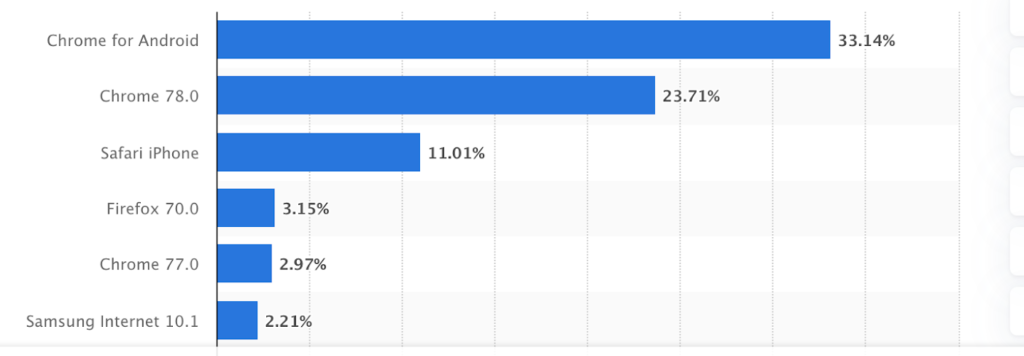In the age of GDPR, how can you leverage non-personalized data?

As we know, data is the lifeblood of all businesses. Online marketing has relied heavily on consumer data collection, particularly the use of cookies. Marketing and sales strategies are shaped by collecting consumer data and aligning strategies to what the data tells them works. With the current state of GDPR regulations, along with Google phasing out third-party cookies in Chrome before 2022, online marketers now face a new challenge. Let’s dive into the discussion around what it means to market to consumers in a cookieless world and what can be done to combat this challenge.
The GDPR climate and the challenges it brings in an online world
GDPR was launched back in 2016, and companies were required to be compliant with the new consumer privacy law. According to RSM, 30% of European businesses are still not entirely GDPR compliant.

Source: RSM
GDPR compliance affects two main online marketing activities – data gathering and targeting. Three years down the line, there are still a substantial amount of businesses struggling to adhere to the consumer protection laws, proving that with the abolition of third party cookie collection, it’s best to understand the challenges ahead, and how your business can be prepared.
No more third-wheeling on cookies
Cookie collection has been a staple in most digital marketing practices over the last decade. With Google phasing it out, online marketers need to reframe their strategies and begin preparing for change. But what exactly does this mean? The ability to track consumers as they browse the internet will be no more. While Google Chrome isn’t the first browser to phase out the infamous third-party cookie, it certainly is the biggest.

Source: Statista
This means marketers will need to shift their strategy to focus on collecting first-party data.
The evolution of the protection of consumer data
In a perfect world, from an online marketer’s perspective, following the digital footprint of consumers would be a free-for-all. But with consumers becoming increasingly aware and understanding the value of the information they’ve been sharing, more big tech companies have established laws to protect consumers’ data. First, enter GDPR, then IDFA from Apple, and now Google’s third-party cookie elimination. Many businesses might be quick to see this as a catastrophe when it comes to data collection, but experts in the field encourage you to view it rather as an opportunity.
What does all of this mean for online marketers?
Let’s lay it on the table. How does this affect online business? How will your data analysis be compromised and what can you do about it?
Potential online advertising problems faced with no more third-party cookies
- Behavioural targeting
Behavioural targeting is the type of data that essentially allows advertisers to “build” personas of people, based on their browser history. Facebook was a major player in this user personas, which will now no longer be allowed. - Retargeting
Retargeting, providing you’re using first party cookie data only, will still be around. However, if your first call of data was from third-party cookies… Well, now’s the time to start paying attention to first-hand data. - Audience extension
Audience extension is the process of showing your online ads to an audience beyond your own website. Without third-party cookies, this won’t be possible. - View-through attribution
With the decline of the third party cookies, marketers will no longer be able to have full transparency with their media mix, in terms of what is converting in terms of performance, vs what isn’t.
How marketers can address third-party cookie deprecation
- Focus on first-party data collection that has been consented to by consumers.
- Obtain authentication from customers in order to understand individual interests and preferences.
- Shift the focus to customer experience.
Leveraging on non-PII data
One of the biggest focuses coming to the forefront after the cookie crumble announcement is companies should start placing more focus on non-PII data. Non-PII data is data that’s anonymous. Non-PII data allows you to track and understand the digital behavior of your consumers. By leveraging and focusing on increasing this type of information, you are able to improve the consumer’s online experience and engagement, focusing on customer experience, to increase your sales and sales strategies.
Need help? Introducing Wandz.ai’s solution
Wandz.ai focuses on what we like to call the Digital Journey Continuity. Why is this relevant? Well, considering the cookieless world we’re about to embark on, Wandz.ai has already leveraged upon the elusive non-PII data to shape the success of many businesses, before the fear of the cookie crumbling. How, what, why, and where? Keep reading…
Through our platform, thousands of data points are collected as soon as the consumer begins their journey on-site. The end-users non-PII data is collected, such as:
- Browser type
- Device type
- Operating System (OS)
- Geo-location (Region)
- Internet speed
By having this type of data on hand, you’re able to personalize the consumer journey using individualized data, increase sales revenues, and decrease advertising spend through Intent-Based Promotions.
Data collection process
Wandz.ai’s code collects data as soon as the customer journey begins. The engine continues to collect time throughout the customer lifecycle, improving the accuracy as time goes on, for the personalised and intent-based promotion offer to be given. Wandz.ai is a solution that allows you to use non-PII data through a powerful platform that automatically matches the right incentive to the customer.
Wandz.ai’s innovative technology works in real-time and provides your site visitors with a promotion, or no promotion at all, based on their intent, per session,within 100ms into the journey. This gives you the highest potential to generate maximum revenue and provide offers to first-time visitors as well as your returning users.
No need to fret about the loss of third-party data. There’s a reason online marketers are tough cookies. Wandz.ai can help with your consumer-centric solution. Ask us how.
